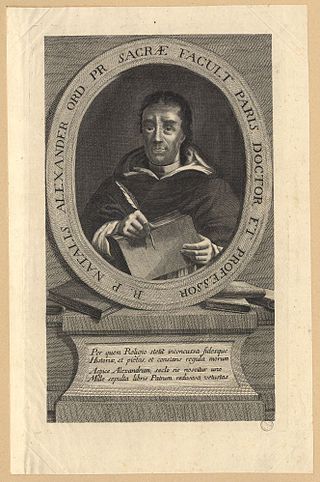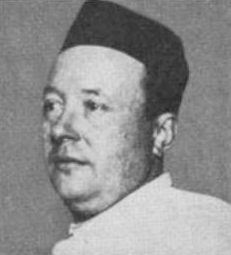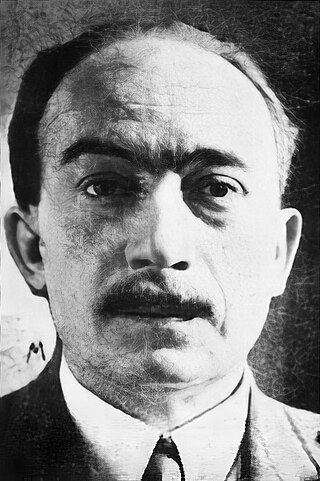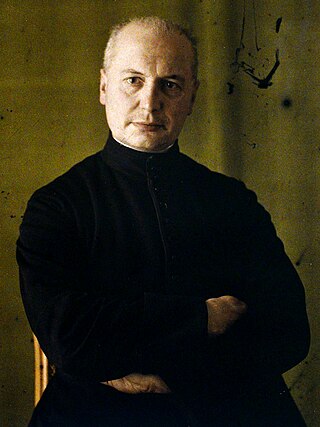Related Research Articles

Noël Alexandre, or Natalis Alexander in Latin was a French theologian, author, and ecclesiastical historian.
Michel-Louis Guérard des Lauriers was a French Dominican theologian and, later in life, a Traditionalist Catholic bishop who supported sedevacantism and sedeprivationism and was excommunicated by the Holy See.

Antoine Fabre d'Olivet was a French author, poet and composer whose Biblical and philosophical hermeneutics influenced many occultists, such as Eliphas Lévi, Gérard Encausse ("Papus") and Édouard Schuré.
Marie-Dominique Chenu was a Catholic theologian and one of the founders of the reformist journal Concilium.
Claude Meillassoux was a French neo-Marxist economic anthropologist and Africanist. A student of Georges Balandier, he did fieldwork among the Guro (Gouro) of Côte d'Ivoire; his thesis was published in 1964. In the 1970s he criticised Marshall Sahlins's use of the notion of "domestic mode of production". Meillassoux was throughout his life a politically committed critic of social injustice.

Pierre Mandonnet was a French-born, Belgian Dominican historian, important in the neo-Thomist trend of historiography and the recovery of medieval philosophy. He made his reputation with a study of Siger of Brabant.

Antonin-Gilbert Sertillanges, O.P., also known as Antonin-Dalmace Sertillanges, was a French Catholic philosopher and spiritual writer.

Servais-Théodore Pinckaers OP was a noted moral theologian, Roman Catholic priest, and member of the Dominican Order. He has been especially influential in the renewal of a theological and Christological approach to Christian virtue ethics.

École biblique et archéologique française de Jérusalem, commonly known as École Biblique, is a French academic establishment in Jerusalem specializing in archaeology and Biblical exegesis. It is housed by the Saint-Étienne priory.
William of Luxi, O.P., also Guillelmus de Luxi or, was born in the region of Burgundy, France, sometime during the first quarter of the thirteenth century. He was a Dominican friar who became regent master of Theology at the University of Paris and a noted biblical exegete and preacher.
Henri Bouillard (13 March 1908 – 22 June 1981) was a French Jesuit theologian.

Benoît Lacroix was a Quebec theologian, philosopher, Dominican priest, professor in medieval studies and historian of the Medieval period, and author of almost 50 works and a great number of articles.

Émile Mireaux was a French economist, journalist, politician and literary historian. In the 1930s, he edited Le Temps and contributed to other right-leaning journals. He became a senator in 1936, and briefly served as a minister in 1940. From 1940 until his death, he held a chair in political economy, statistics and finance at the Académie des Sciences Morales et Politiques.

Yves de La Brière was an influential French Jesuit theologian and author. He was a monarchist and supported the League of Nations. He was opposed to war, but wrote on the Christian tradition of just war. He was involved in the controversy in 1926 over the relationship between the Catholic church and the Catholic monarchist Action Française, which the Pope refused to support.

Paul Bourdarie was a French explorer, journalist, lecturer and professor. He became known as a specialist in colonial topics and gave lectures on subjects such as growing cotton and domesticating African elephants. He believed in a liberal policy regarding the indigenous people of the French colonies. Bourdarie was one of those responsible for founding the Grand Mosque of Paris.
Charles Perrot, was a French Roman Catholic priest and biblical scholar, He served as honorary professor of New Testament at the Catholic Institute of Paris. A specialist in contemporary Judaism of Jesus, Perrot has been known for his studies of the historical Jesus and the New Testament.
Dominique Dubarle was a French Dominican friar and religious philosopher, a professor at the Saulchoir. He was dean of the faculty of philosophy of the Catholic Institute of Paris from 1967 to 1973 and was an expert at the Second Vatican Council.
Jean-Pierre Jossua was a French writer and theologian. He was a member of the Dominican Order and spent his career writing, teaching, and researching. He was a professor of dogmatics at Saulchoir.
The Institut des mondes africains (IMAF) is a French academic mixed and interdisciplinary research unit for African studies, in which the national research organisation CNRS, three other French national academic research institutions and two universities collaborate. They are the Institut de recherche pour le développement, the École pratique des hautes études (EPHE), the École des hautes études en sciences sociales and the Aix-Marseille University and the Pantheon-Sorbonne University.
Bernard Barc was a French lecturer and an author of the Bibliothèque Copte de Nag Hammadi (BCNH) volumes, as well as publications on the history of ancient Jewish hermeneutics.
References
- ↑ "Histoire de la Bibliothèque du Saulchoir". Bibliothèque du Saulchoir (in French). Retrieved 2024-08-29.